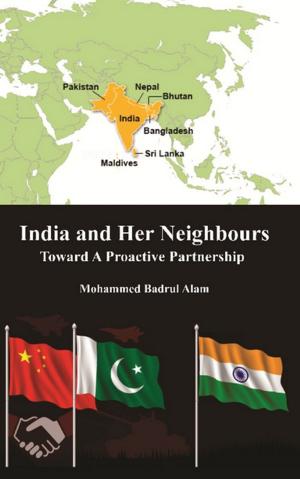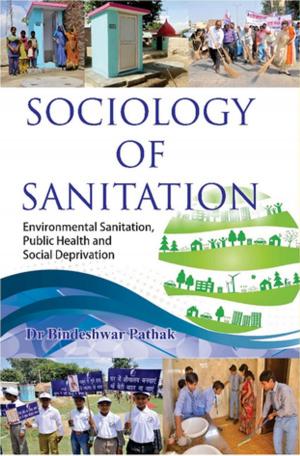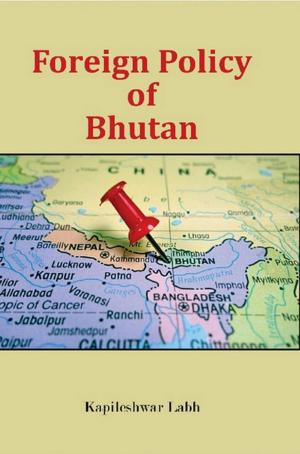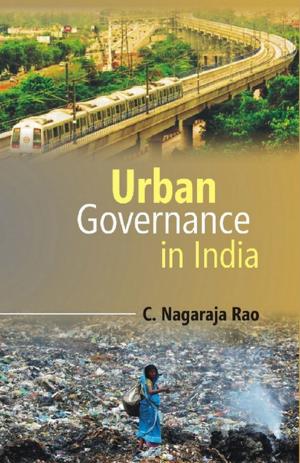Sociology and Sanitation
Themes and Perspectives
Nonfiction, Social & Cultural Studies, Social Science, Volunteer Work| Author: | Ashish Saxena | ISBN: | 9789351289425 |
| Publisher: | Kalpaz Publications | Publication: | June 30, 2015 |
| Imprint: | Kalpaz Publications | Language: | English |
| Author: | Ashish Saxena |
| ISBN: | 9789351289425 |
| Publisher: | Kalpaz Publications |
| Publication: | June 30, 2015 |
| Imprint: | Kalpaz Publications |
| Language: | English |
Exclusion from safe water and basic sanitation destroys more lives than any casualty. As an 'instrumental' exclusion it reinforces the deep inequalities in life chances and life styles that divide countries and people on the basis of spatial, wealth, gender, caste and other markers for deprivation. The works emphasizes that the idea of sanitation is a buzz word for various development policies and planning ensuring community participation. Intricacies of sanitation urgently need to be tapped in a holistic framework. The book presents the issues of sanitation in a jacketed configuration as follows: “I n a broader sense sanitation implies management, operation and maintenance of human/social ecology involving 'greater hygiene' and referring to scientifically derived people's capability to achieve their primal physical, biological, psychological, philosophical , social and economic needs and entitlements. It involves the well-being of individuals through exclusion or neutralization of elements (social or physical) dysfunctional to them and their community. Good sanitation is a 'way of life' and an effective tool for progress of one's mind, body and surroundings in terms of health, scientific temper , secular behaviour in an acceptable, affordable and sustainable way”. The present compilation modestly attempts to broaden the horizon of sanitation beyond physical and environmental cleanliness and hygiene. The social science academia needs to encompass sanitation discourse on diverse juxtaposed issues such as justice, empowerment, subaltern, multiculturalism and social inclusion. This book is a critique and systematic documentation of the experiences and discourses of the 'sociology of sanitation' across global world in general and South Asia in particular. Present stimulating inter disciplinary dialogue makes a more meaningful attempt towards theoretical orientation on the idea of 'sociology of sanitation'. Appropriating a considerable reader on sociology of sanitation across disciplines, this book provides deeper insights about inevitability of sanitation entrenched across contemporary developing and underdeveloped nations and provoking the advocacy for sanitation of individuals, society and the environment. Finally, this book will be tempting and pertinent to academicians, practitioners and scholars interested in development, health, social reforms, subaltern, inclusive policies, sustainability and overall well-being in South Asian perspective.
Exclusion from safe water and basic sanitation destroys more lives than any casualty. As an 'instrumental' exclusion it reinforces the deep inequalities in life chances and life styles that divide countries and people on the basis of spatial, wealth, gender, caste and other markers for deprivation. The works emphasizes that the idea of sanitation is a buzz word for various development policies and planning ensuring community participation. Intricacies of sanitation urgently need to be tapped in a holistic framework. The book presents the issues of sanitation in a jacketed configuration as follows: “I n a broader sense sanitation implies management, operation and maintenance of human/social ecology involving 'greater hygiene' and referring to scientifically derived people's capability to achieve their primal physical, biological, psychological, philosophical , social and economic needs and entitlements. It involves the well-being of individuals through exclusion or neutralization of elements (social or physical) dysfunctional to them and their community. Good sanitation is a 'way of life' and an effective tool for progress of one's mind, body and surroundings in terms of health, scientific temper , secular behaviour in an acceptable, affordable and sustainable way”. The present compilation modestly attempts to broaden the horizon of sanitation beyond physical and environmental cleanliness and hygiene. The social science academia needs to encompass sanitation discourse on diverse juxtaposed issues such as justice, empowerment, subaltern, multiculturalism and social inclusion. This book is a critique and systematic documentation of the experiences and discourses of the 'sociology of sanitation' across global world in general and South Asia in particular. Present stimulating inter disciplinary dialogue makes a more meaningful attempt towards theoretical orientation on the idea of 'sociology of sanitation'. Appropriating a considerable reader on sociology of sanitation across disciplines, this book provides deeper insights about inevitability of sanitation entrenched across contemporary developing and underdeveloped nations and provoking the advocacy for sanitation of individuals, society and the environment. Finally, this book will be tempting and pertinent to academicians, practitioners and scholars interested in development, health, social reforms, subaltern, inclusive policies, sustainability and overall well-being in South Asian perspective.















